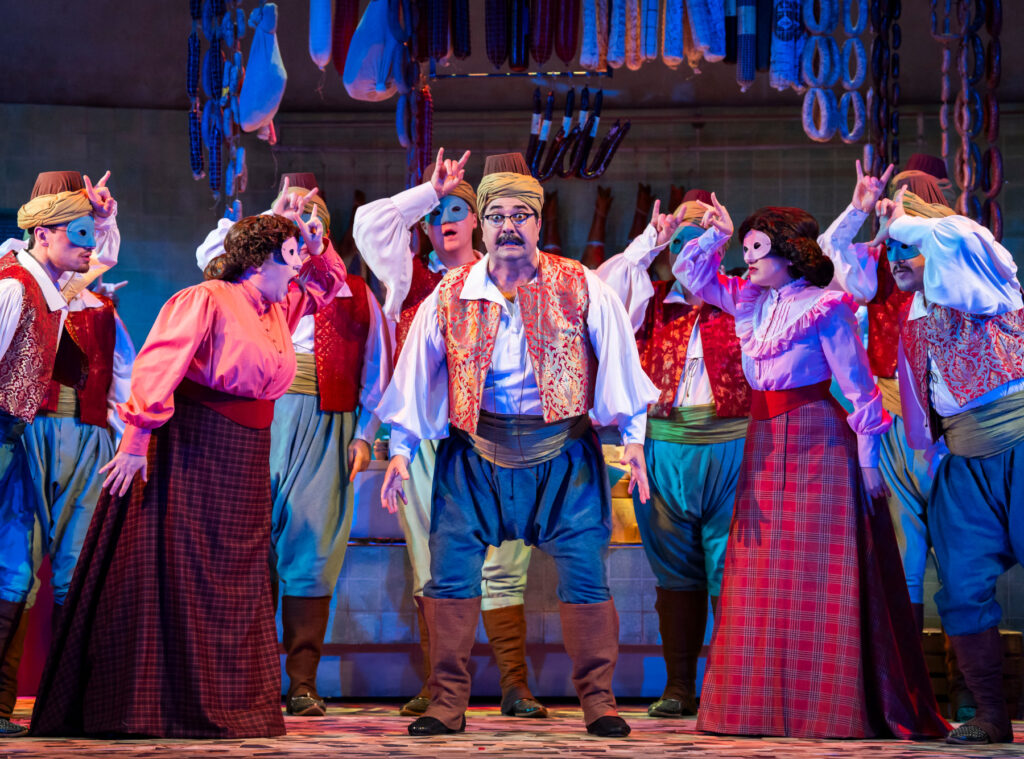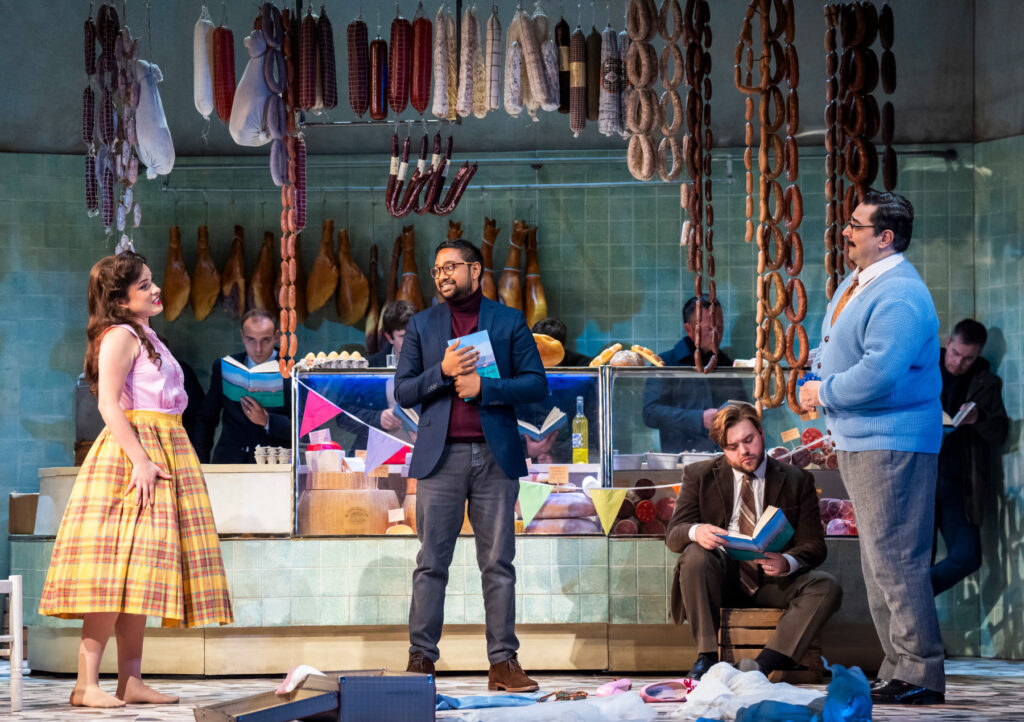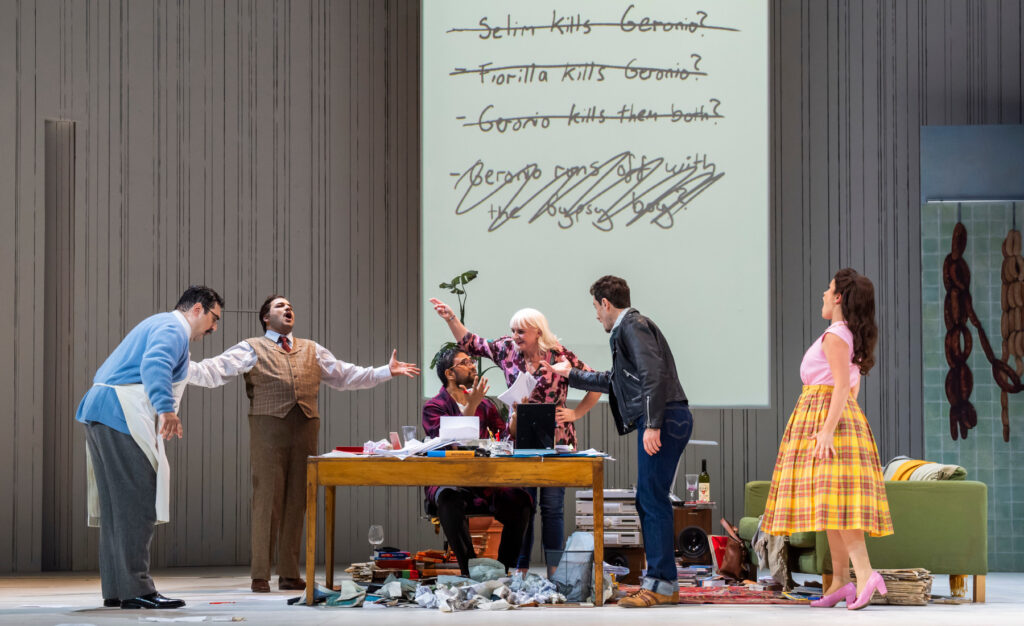The choice of Il turco in Italia for Glyndebourne in May 2021 might have been made in recognition of its London premiere exactly two centuries earlier in May 1821 at the King’s Theatre in Drury Lane. Within that time frame, the fortunes of Rossini’s work have improved only in recent years with performances at Covent Garden and Garsington to name just two stagings. If Glyndebourne’s first presentation of Il turco in 1970 was not memorably served, Mariame Clément’s new production, first shown there three years ago, was an inspired creation. Little wonder, after its success, that it has returned to Sussex in this first revival under Ian Rutherford.
One might wonder why it’s taken so long for Rossini’s 1814 opera buffa to become better known. Never mind the stereotypes; the elderly cuckold, his promiscuous wife and a randy foreigner (the Turk of the title), Clément’s smart directorial intervention gives the plotline a neat twist. And for those unfamiliar with the storyline, the clue’s in the title. A wealthy Turk, Selim, scours Italy for young women to join his harem and discovers Fiorilla (married, but willing and already in a liaison with Don Narciso), before encountering one of his previous lovers, Zaida, who has become a gypsy.

But what gives this production some bite is Clément’s reimagining of the role of the author Prosdocimo who we first meet for a book signing of his latest tome during the Overture. Battling writer’s block, his search for a plot for a new comedy prompts Clément to place him centre stage throughout Act One. From his chaotic apartment and messy desk, the creative process of Il turco unfolds, projected on to a huge scribbling book with corrections and revisions made by the main characters whose actions and costumes change on the whim of the writer. Even the timeframe abruptly shifts from 19th century (“not sexy”) to the mid-20th century (“neorealist”). The Turk transforms from traditional costume to leathers and jeans and runs a garage (Fiat, of course), while Fiorilla’s duped husband, Don Geronio, suddenly becomes the owner of an Italian delicatessen. You get the idea. Added to that, Prosdocimo has a non-singing girlfriend (Anna-Marie Sullivan reprising her role from 2021) who also contributes to the opera’s plot. And through Clément’s directorial ingenuity those stereotypes are humorously quashed, or at least made inoffensive.

By Act Two, characters have fully evolved and Prosdocimo’s paper-strewn study is now a fully stocked delicatessen (designer Julia Hansen has done wonders here) which Geronio runs with his assistant Don Narciso. It’s the location for a Laurel and Hardy knockabout fight involving a string of sausages. It could have been a toe-curling episode, but here is comedy gold. There follows a fancy-dress party where nobody recognises anyone but prompts a reconciliation between Fiorilla and her husband (not before her humiliation) and where the love between Selim and Ziada is rediscovered.

It’s not just the farce that keeps this operatic pot boiling, as there’s some terrific chemistry with barely a weak link. The developing passion between Selim (Michael Mofidian) and Fiorilla (Inna Demenkova) is wholly convincing – both singers at ease with Rossini’s vocal demands. Demenkova is a pure-toned and coolly manipulative Fiorella and fully inhabits her role, drawing our sympathy in a coloratura aria bewailing her supposed abandonment. Mofidian, meanwhile, is a charismatic, sonorous Selim, and well matched by the baritone of Fabio Capitanucci’s hapless, but genuinely funny Don Geronio. Elsewhere, Agustin Gómez as Narciso felt a little underpowered on opening night and strained to reach Rossini’s high notes but held our gaze while strumming his own accompaniment on a Parma ham. Grace Durham’s Zaida is nicely characterised (her crystal ball scene very fine) and her well upholstered mezzo brings its own dividends. No less effective are Ross Ramgobin as Prosdocimo and Rhys Batt as Albazar. Much as been said of the work’s ensemble numbers and these were all executed with aplomb, the quintets closing each act sung with remarkable assurance.
In the pit Olivia Clarke coaxes fine playing from the players of the Glyndebourne Sinfonia, generating some standout playing once they had found their form. Overall, this is an outstanding revival, its wit and ingenuity guaranteed to provoke laughter and admiration, and thanks in no small part to Lucy Wadham’s additions. One might, with not too much persuasion, even agree with The Times critic of 1821 when he suggested Il turco “may rank amongst the most pleasing of Rossini’s compositions”.
David Truslove
Il turco in Italia
Music:Gioachino Rossini
Libretto: Felci Romani, after a libretto by Caterino Mazzolà
Cast and production staff:
Zaida – Grace Durham; Selim – Michael Mofidian; Donna Fiorilla – Inna Demenkova; Don Geronio – Fabio Capitanucci; Don Narciso – Agustin Gómez; Prosdocimo – Ross Ramgobin; Albazar – Rhys Batt; Girlfriend – Anna-Marie Sullivan; Director – Mariame Clément; Revival Director – Ian Rutherford; Designer – Julia Hansen; Lighting – Bernd Purkrabek; Text – Lucy Wadham; Video – David Fricker; Conductor – Olivia Clarke; Glyndebourne Sinfonia & Glyndebourne Chorus.
Glyndebourne, Sussex, 12 October 2024
Top image: Selim (Michael Mofidian) and Prosdocimo (Ross Ramgobin)
All photos: Glyndebourne Productions Ltd. Photographer: Tristram Kenton
–